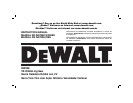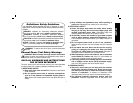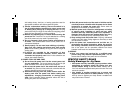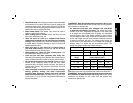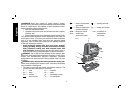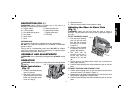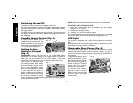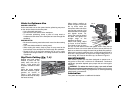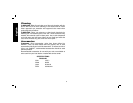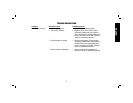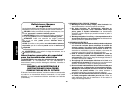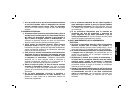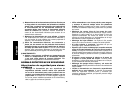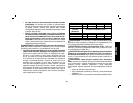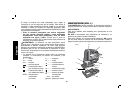
7
English
Hints for Optimum Use
SAWING LAMINATES
As the saw blade cuts on the upward stroke, splintering may occur
on the surface closest to the shoe plate.
– Use a fine-tooth saw blade.
– Saw from the back surface of the workpiece.
– To minimize splintering, clamp a piece of scrap wood or
hardboard to both sides of the workpiece and saw through this
sandwich.
SAWING METAL
– Be aware that sawing metal takes much more time than sawing
wood.
– Use a saw blade suitable for sawing metal.
– When cutting thin metal, clamp a piece of scrap wood to the
back surface of the workpiece and cut through this sandwich.
– Spread a film of oil along the intended line of cut for easier
operation and longer blade life. For cutting aluminum, kerosene
is preferred.
Rip/Circle Cutting (Fig. 7, 8)
Ripping and circle cutting
FIG. 7
K
without a pencil line are
easily done with the rip
fence / circle guide (not
included; available at extra
cost).
Using the screw supplied
with the accessory guide,
position as shown in
Figure 7 and thread the
screw into the shoe to clamp
the fence securely.
When ripping, position as
J
FIG. 8
shown in Figure 7 and slide
the rip fence under the
screw from either side of the
saw. Set the cross bar (J) at
desired distance from blade
and tighten screw. For
ripping, the cross bar should
be down and against the
straight edge of the
workpiece as shown.
When circle cutting, adjust
rip fence so that distance
from blade to hole in fence
arm (K) is at the desired radius and tighten screw. Place saw so
that hole in fence arm is over center of circle to be cut (drill hole for
blade or cut inward from edge of material to get blade into position).
When saw is properly positioned, drive a small nail through hole in
fence arm. Using rip fence as a pivot arm, begin cutting circle. For
circle cutting, the cross bar should be up, as shown in Figure 8.
MAINTENANCE
Your DEWALT power tool has been designed to operate over a
long period of time with a minimum of maintenance. Continuous
satisfactory operation depends upon proper tool care and regular
cleaning.
WARNING: To reduce the risk of injury, turn unit off and
disconnect tool from power source before installing and removing
accessories, before making any adjustments or removing/installing
attachments or accessories.
Lubrication
Your power tool requires no additional lubrication.



